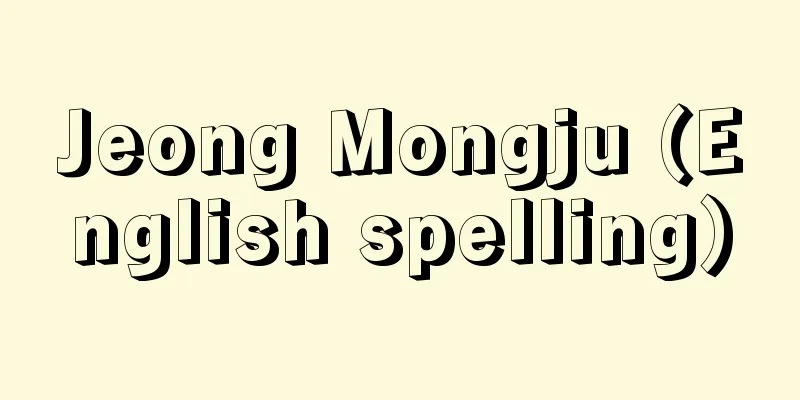Jeong Mongju (English spelling)

|
[Born] King Chungsuk 7 (1338) [Died] Daiso 1 (1392) A Korean politician and Confucian scholar in the late Goryeo period. Born in Yeongil, Gyeongsang Province. His pen name was Dalka, his title was Poeun, and his posthumous name was Munchung. In the 9th year of King Gongmin's reign (1360), he entered the government with the highest grade in the Literature Department, and was promoted to Menka Shijung and Tohyoisashi. When the Ming Dynasty was founded in China in 1368, he played an active role in establishing diplomatic relations with the Ming Dynasty as it took over the Ming Dynasty. He also participated in the suppression of the Jurchen tribes and Japanese pirates, and in the 3rd year of King Goryeo's reign (77), he came to Hakata in Japan to negotiate the suppression of Japanese pirates. When the popularity of the military commander Yi Seong-gye grew, he learned that his faction was plotting to support Yi Seong-gye and seize national power, and he tried to eliminate them, but was killed instead. However, his principles were praised by later generations as a model of a loyal subject. He also excelled in Neo-Confucianism and was called the father of Eastern theory. He popularized the Zhu Xi Family Law, built a school in Gyeonghyang, and worked to promote education. He also published the New Law, which was appropriate for Goryeo society and was based on the Daeming Lu, and sought to establish legal order. He was skilled in poetry, calligraphy, and painting, and one of his works was the Poeunji. In the 18th year of King Taejong's reign (1418), he was posthumously awarded the title of Prime Minister. Source: Encyclopaedia Britannica Concise Encyclopedia About Encyclopaedia Britannica Concise Encyclopedia Information |
|
[生]忠粛王7(1338) [没]大祖1(1392) 朝鮮,高麗末期の政治家,儒学者。慶尚道迎日の人。字は達可。号は圃隠。諡は文忠。恭愍王9 (1360) 年文科の壮元 (首席合格) で官界に入り,昇進して門下侍中,都評議使司に進んだ。 1368年中国に明が建国されると明交代とともに明との国交樹立に活躍し,一方,女真族や倭寇の討伐にも参加,ご王3 (77) 年には日本の博多に来て倭寇の禁圧について交渉した。武将李成桂の人望が高まり,その一派が李成桂を擁立して国権を奪う陰謀のあることを知り,その除去をはかったが,逆に殺された。しかしその志操は後世に忠臣の模範としてたたえられた。また性理学にすぐれ,東方理学の祖といわれ,『朱子家礼』を普及して京郷に学校を建て,教育振興に努め,また大明律を参酌して高麗社会にふさわしい『新律』を刊行して法秩序の確立をはかった。詩文や書画にも巧みで,著書に『圃隠集』がある。太宗 18 (1418) 年領議政を追贈された。 出典 ブリタニカ国際大百科事典 小項目事典ブリタニカ国際大百科事典 小項目事典について 情報 |
Recommend
Alisiia
…The ancient name was Alesia. There have been var...
'Khyug yig (English spelling) khyugyig
...Some consonants change their shape when combin...
pardo
...During this time, approximately 300,000 Asians...
Akseli Gallen‐Kallela
1865‐1931 A representative Finnish nationalist rom...
al-Mustanṣir (English spelling) alMustansir
…Meanwhile, the Ismaili missionary organization w...
Indigestion - shoukafuryou
A condition in which digestive ability is impaired...
Arbogast (English spelling)
[raw]? [Died] September 8, 394. A Roman general of...
North West Company
Also known as the Northwest Fur Company. A fur tra...
Uncle
...Nephews and nieces are a type of collateral re...
milking machine
…In Japan, it is used to mean a milking machine, ...
red bat
…Its English names include red bat, which refers ...
Mount Katamuki
One of the main peaks in the Kyushu Mountains, lo...
Cuprammonium Rayon - Cuprammonium Rayon
A type of regenerated cellulose fiber. Also known ...
Image orthicon
… [Camera Tube] Starting with the iconoscope, man...
Shari - Shari
[1] (noun) (a transliteration of śarīra, meaning b...









